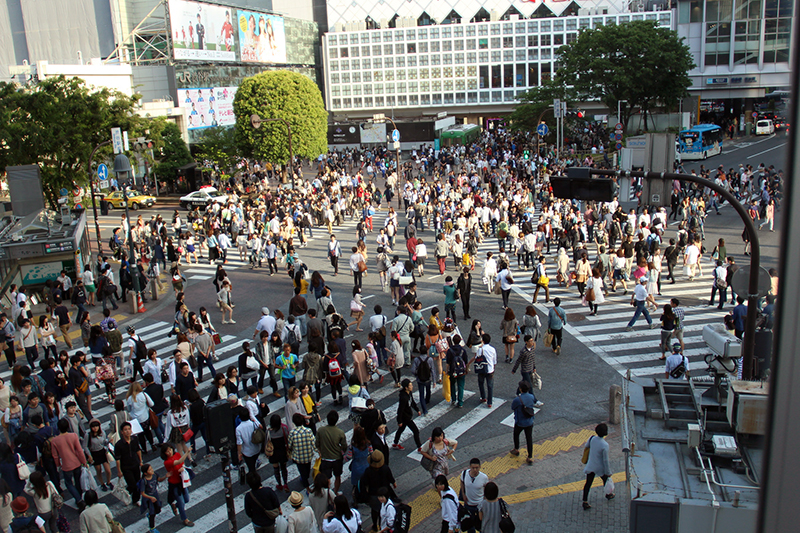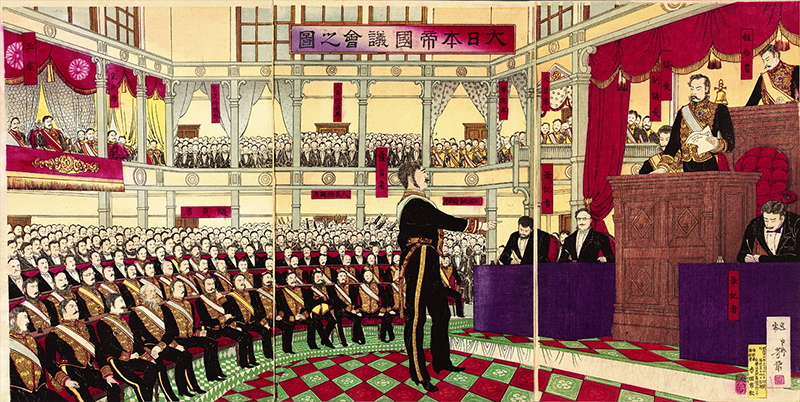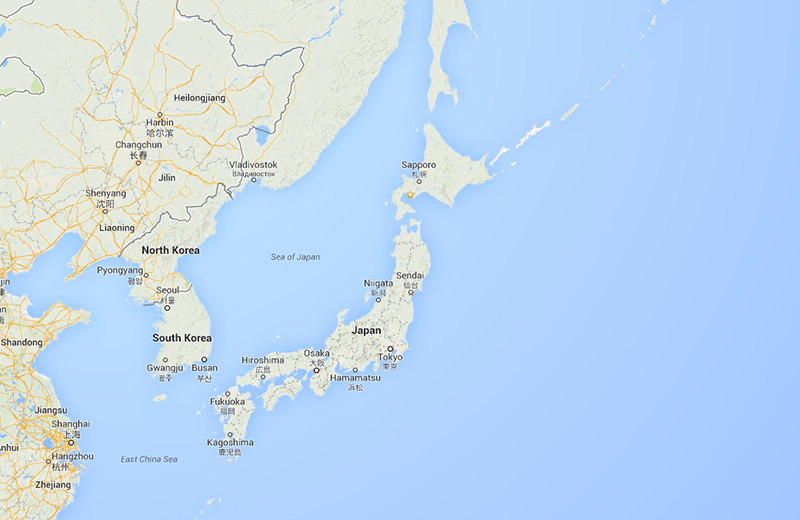Remembering or catching unfamiliar foreign names is one difficulty you're likely to encounter while studying another language. I too have struggled immensely when trying to catch people's names that are not familiar to me, and once wrote an article about my experience with this in The Difficulty Of Names. I imagine it's much like that for all of you trying to remember so many unfamiliar Japanese names as well, so I wanted to help you out with this by writing a series of posts on Japanese names. The rabbit hole goes much deeper than you might expect!
How Many Family Names Are There In Japan?

Japan has a lot of family names. According to the family name directory 日本苗字大辞典, written by Motoji Niwa (1919-2006) who spent a lifetime researching family names, place names, and Japanese family crests, there are about 300,000 family names in Japan. This takes into account some kanji orthography differences and small pronunciation differences. He also said that of those 300,000 names, around 7000 of them cover around 96% of the population, meaning 4% are considered strange and rare.
On the flip side of the coin, the 10 most common names cover around 10% of the Japanese population. Given that Japan is generally considered to be a fairly homogenous population of 130 million people, it seems a bit strange that there are that many names. Another researcher of family names, Hiroshi Morioka, pointed out that some of them may be imaginary names and the actual existence of them is not yet proven. He calls such names 幽霊苗字, which literally means "ghost family name." He thinks the number of actual Japanese family names is around 150,000, but this doesn't consider kanji orthography or kanji pronunciation differences as separate names. He also doesn't include the "ghost names."
Doing this got rid of quite a few names. Despite this, there's still enough names to fill a pretty hefty book. Why is that? Let's take a look at the most common name in the world first, before we get into the huge variety that is Japanese names.
The most common name in the world is Lee 李. This name is used in China, Korea, Taiwan, and Vietnam. It is pronounced "Li" in China, North Korea, Taiwan, and Vietnam. In South Korea it's pronounced "Yi." When compared to Chinese and Korean people, who must keep their ancestors' family names, Japanese family names were often changed and even created from time to time. It's assumed that 80-90% of Japanese family names are named after places. Other names come from occupations, names given to entire families of traditional Japanese stage actors, and also uji 氏, names derived from titles among the ancient Yamato kinship.
Even today, new names are being made, so long as you consider foreigners coming in and obtaining Japanese citizenship, then obtaining a kanji for their name. For example, the soccer player Santos Alessandro changed his name into santosu 三都主 aresandoro アレサンドロ and the guitarist Claude Ciari changed his name to chiari 智有 curoudo 蔵上人.
Brief History Of Japanese Family Names

Looking back through Japanese history, I came to know that Japanese names come from many sources.
In ancient times, Japan had a "clan system" shizoku 氏族, with which they had family / clan names uji 氏 that came from their occupations and various regional features, like rivers, mountains, valleys, and so on.
Later, when the Yamato Dynasty united Japan (around 250AD), they introduced a new naming system called 氏姓制度 (ujikabane-seido/shisei-seido). These names were given by the Imperial Court to nobles and powerful local clans and included a hereditary title according to each person's degree of contribution to the state.
In the Heian period (794-1185), the nobles and samurai began to use other family names in order to distinguish one group from the next. After all, if too many people have the same family names, things will get a little confusing.
By the time we reach the feudal period (1603–1868), only nobles, samurai, and merchants had family names (specifically kabane 姓 – a type of family name that refers to personal status).
Then, in the Meiji Era (1868-1912), an order was issued that made it mandatory for all commoners to have family names. So in 1875, all Japanese citizens could have both a first and last name myouji 名字. During this time, though, many people had to come up with their own family name (which is one of the reasons why you see such a huge variety of Japanese names out there today).
Before we finish with the history, I want to explain something about the three different kanji I used to explain family names. They were 氏, 姓, and 名字. To put it simply, 氏 and 姓 used to be the Chinese family name system. In this system you couldn't change anything and it passes on to your descendants. Calling someone with their 氏姓 name was considered rude, so people used 名字 as a formal type of nickname instead. In many Asian kanji using countries, this 氏姓 system remains and is the reason why they have way fewer family names. In Japan, people had both 氏姓 and 名字 for a time. Since 名字 wasn't technically a "real name", they changed it from time to time depending on their jobs or new environments. After a while, these "nicknames" became formal family names, so you won't see people changing their family names willy nilly anymore.
Common Family Names And Regional Features

According to research conducted by Meiji Yasuda Life Insurance Company in 2013, the three most common Japanese family names are Satou 佐藤, Suzuki 鈴木 and Takahashi 高橋. Those names also happen to be more common when you look at certain regions of Japan. In the Kanto region, in and around Tokyo, Suzuki 鈴木 is the most common name. In North-Eastern Japan (including Hokkaido), 佐藤 is the most popular. Growing up, I remember how I always thought that Suzuki 鈴木 was the most popular name. Because computers hadn't caught on yet, they only took polls in and around the Kanto region, due to its dense population. That was a mistake though, because when they finally did a nationwide poll, they found out that Suzuki was not the most common name. Regions, it turns out, were important!
In the Kansai area as well as some parts of Kyuushuu, the most popular names are Tanaka 田中 and Yamamoto 山本. Each prefecture has their own particular family names. A good example of this is Okinawa. The 20 most common family names in Okinawa were all unique to Okinawa, since these family names came from the Ryuukyuu Kingdom.
Beyond this, there is data on the most common "ancient family names" as well. These names are Minamoto 源, Taira 平 (), Fujiwara 藤原, and Tachibana 橘. Of these, the first three were names given as a reward from the Emperor, so as you can see these names go back quite a ways.
In case you were wondering, the Emperor himself doesn't have a family name. They are considered a person of divinity that doesn't belong to any clan, so no name family name was given.
Rare And Unique Family Names In Japan

In Japan right now, there are at least 10,000 different family names that are being used by 100 or fewer people. That is a surprisingly vast number of names that are equally rare and in danger of disappearing entirely. I came across the webpage エンタメハウス which introduces 20 names that will be used by 5 or fewer families as of February 2014. Here are some good ones:
- mawarimichi 回り道, which means "detour", is used by 3 families
- toukyou 東京 literally "Tokyo" is used by one family living, ironically, in Osaka
- pengin 辺銀, which is pronounced exactly the same as the word "penguin" in Japan is used by 1 family.
- unagi 鰻, meaning "eel" is used by 2 families
- nekoyashiki 猫屋敷, which means "cat house" is used by 5 families. As for other unique names, some of them were influenced by religion and use the kanji 神 (god), while other names use 鬼 (demon, ogre). The kanji 神 (god) is often read in one of the following ways: Kami, Kanae, Jin, Shin, Kou, Miwa, Koo, or Kan. 龍神 is commonly read as Ryuujin or Tatsugami. 鬼 also has several ways to read it, including: Oni, Ki, Kisaragi, or Kiin. Just one name, 百目鬼, can have so many readings. Doumeki, Domeki, Momomeki, Hyakumeki, Todomeki, or Momeki.
God-names are to be expected, though. In terms of rare and unique family names, I was most surprised to learn that it's not totally unheard of for simple dates and numbers to be used as family names as well. For example, 正月一日, which is usually pronounced "shougatsu-tsuitachi" and means January first, can be the name "Ara" or "Ao." The date of April Fools 四月一日 (shigatsu tsuitachi / April 1st) can be used as a family name as well, and is pronounced "Tsubomi" or "Watanuki". In fact, perhaps even more startling is that "123" written 一二三 is an actual family name too. It is pronounced "Hifumi". Another similar name "753" (七五三) exists as well and is pronounced "Shime" or "Nagomi".
I could go on and on with rare and unique Japanese family names. Surprisingly, this is only a small sample of what's out there, so make sure that you keep an eye out!
Understandable And Un-understandable Family Names
Some of the origins of Japanese family names are understandable. Regional names such as Fukuoka 福岡 (), Miyako 京都 (meaning Kyoto), and Tokyo 東京 are one good example. Occupation-related names such as Kaji 鍛, meaning sword-smith, or Kashiwade 膳夫, meaning chef, get a nod of approval too. Other names, which were created over time seem geared towards a particular feeling they want their family to represent. For example Senju 千寿, which means 1000 congratulations or Koufuku 幸福, which means happiness, make for a very optimistic family if you ask me. Then there's the Shio/En 塩 salt, Satou 砂糖 (sugar), miso 味噌 (Miso) and Shouyu 醤油 (soy sauce) families who were perhaps all very into cooking and cooking ingredients. Still, these are understandable.
But then it starts to get weird. There are some Japanese family names that are so ridiculous that I'm forced to believe that someone was playing some kind of horrible family prank when they named themselves. Cow Poop (Ushikuso 牛糞), Horse-Butt (Umajiri 馬尻), and Boar-Crotch (Inomata/Imata 猪股: ) are actual people in Japan. If they wanted a memorable name, they've certainly achieved it, but I can't imagine what it's like to grow up with a name like that as a child.
Although, I'm proud to have a family name that is one of the most common in Japan, I also think it would be kind of cool to have one of the really unique names that I've come across while researching this article. Having said that, there are definitely some names that are a bit too unique – I'm talking to you Mr. Sheep-Anus. My fingers are crossed that that name doesn't actually exist, though I can't be so sure.
